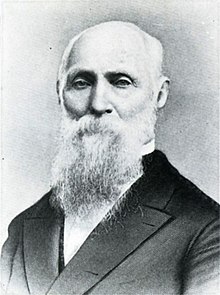William W. Chapman
William Williams Chapman (born August 11, 1808 in Clarksburg , Virginia , † October 18, 1892 in Portland , Oregon ) was an American politician . Between 1838 and 1840 he represented the Iowa Territory as a delegate in the US House of Representatives .
Career
William Chapman was born in Clarksburg in what is now West Virginia in 1808 . He attended the public schools in his home country. After a subsequent law degree and his admission to the bar, he began to practice in Middleton, Virginia in his new profession. In 1835 he moved to what was then the Michigan Territory . He was one of the first settlers in Burlington , which is now part of Iowa . In 1836 he was a district attorney in the Michigan and then the Wisconsin Territories .
Politically, Chapman was a member of the Democratic Party . When the new Iowa Territory was granted congressional representation, Chapman was elected the first delegate of the new Territory to Congress in Washington, DC . He exercised this mandate between September 10, 1838 and October 27, 1840. He had no right to vote in Congress. Due to the legal requirements of his territory, his term of office ended in October 1840 and not at the end of the legislative term of the Congress on March 3, 1841. His mandate fell on October 28, 1840 to Augustus C. Dodge .
In 1843 Chapman moved to Wapello County , Iowa. In 1844, he was a delegate to the first constituent assembly for Iowa, held in Iowa City . Chapman left Iowa in 1847; he first moved to Oregon and in 1848 to California , where the gold rush broke out at that time . He later returned to Portland, Oregon, where he worked as a lawyer. In 1849 he was a member of the Territorial House of Representatives. He also helped build the infrastructure of the city of Portland and with the Oregonian he founded the first newspaper in the Oregon Territory . In 1853, Chapman moved to Fort Umpqua in southern Oregon. There he ran cattle on a ranch. But he kept his law firm in Portland. During the so-called Rogue River War (1855-1856), a local Indian war, Chapman was a lieutenant colonel in the militia. In 1857 he moved to Eugene . Between 1857 and 1861 he was the head of land surveying in his area. During this time, Oregon became an official state of the United States in 1859 .
After Abraham Lincoln was elected president, Chapman resigned as he was in opposition to the new federal government and the Republican Party . In the following years he lived again in Portland, where he worked as a lawyer and promoted the railway expansion. In 1868 he was elected to the Oregon House of Representatives. There he arranged for a government grant of $ 30,000 to buy and operate a steamboat that was used as a pilot boat in the mouth of the Columbia River to increase shipping and thus trade in this region. William Chapman died in Portland on October 18, 1892. He had been married to Margaret Ingraham since 1832, with whom he had seven children.
Web links
- William W. Chapman in the Biographical Directory of the United States Congress (English)
- William W. Chapman in the database of Find a Grave (English)
| personal data | |
|---|---|
| SURNAME | Chapman, William W. |
| ALTERNATIVE NAMES | Chapman, William Williams (full name) |
| BRIEF DESCRIPTION | American politician |
| DATE OF BIRTH | August 11, 1808 |
| PLACE OF BIRTH | Clarksburg , Virginia |
| DATE OF DEATH | October 18, 1892 |
| Place of death | Portland , Oregon |

